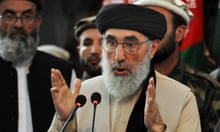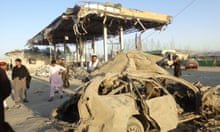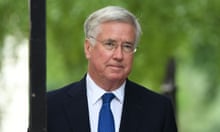Donald Trump’s new strategy for the war in Afghanistan has been praised by Afghan government officials for increasing troop numbers, doing away with strict timelines and for upping pressure on Pakistan, which Kabul sees as a main sponsor of the insurgency.
But Pakistani security officials have accused the US president of shifting blame for its failures in the war against the Taliban and other armed groups in Afghanistan, and of endangering the already fraught bilateral relations between Washington and Islamabad.
In a televised address on Monday, Trump said he was setting out a new “fight-to-win” strategy for Afghanistan, but did not say how many more troops he would send, how long they would stay, or what their ultimate objective was. Trump had once called the mission futile, but said he had been convinced that “a hasty withdrawal would create a vacuum for terrorists, including Isis and al-Qaida”.
He said there would be more onus on the Afghan government to perform better, in civilian and military terms, and he had sharp words for the Pakistani government, calling on Islamabad to cut support for militants who find a haven along the Afghan border and warning Pakistan would have “much to lose” if it did not comply.
“The strategy is made in accordance with realities on the ground,” said Najibullah Azad, a spokesman for the Afghan president, Ashraf Ghani. “This is the first time the US government is coming with a very clear-cut message to Pakistan to either stop what you’re doing or face the negative consequences.”
While acknowledging America’s strong relations with Pakistan and its sacrifices to terrorism, Trump said a new approach to Pakistan would be a “pillar” of the strategy.
“We can no longer be silent about Pakistan’s safe havens for terrorist organisations, the Taliban and other groups that pose a threat to the region and beyond,” he said in his speech.
Trump’s predecessor Barack Obama also sought to coerce Pakistan to drop its alleged support for insurgent groups, including by withholding military aid and refraining from visiting Islamabad.
While Trump’s speech was light on detail and specificity, Afghan officials praised him for allowing them some breathing space.
The Afghan ambassador to the US, Hamdullah Mohib, called the speech a “shift away from talking about timetables and numbers to letting conditions on the ground determine military strategy”.
Mohib said the new strategy was a break with “micromanagement from Washington”, and with silence over Pakistani shelters for terrorists.
Afghan analysts also saw a change in tone from the Obama administration.

“The new strategy is premised on ‘peace through strength’, in contrast to Obama’s failed approach, which was essentially ‘peace through appeasement’,” said Davood Moradian, the director general of the Afghan Institute for Strategic Studies in Kabul.
“However, implementing such a strategy and winning this kind of war requires a legitimate and functioning state, empowered communities, alongside well-equipped and motivated security forces,” he added.
The hardened rhetoric towards Pakistan comes when other regional powers are increasingly trying to assert their influence in south Asia. Pakistani officials said Trump’s attempts at strong-arming Pakistan risked alienating it.
Naeem Khalid Lodhi, a defence analyst and retired general, said the US was to blame for its own failures in Afghanistan.
“They are shifting blame to Pakistan,” he said. “Pakistan should not remain silent against such US behaviour and we should work to build a new political and strategical bloc with big powers like Russia and China.”
A senior Pakistani intelligence official said: “Pakistan itself is the victim of terrorism. We are fighting militants and have conducted many ground and aerial operations and destroyed their sanctuaries. We want to eradicate them physically and ideologically.”
Trump’s line on Pakistan also gave some Afghan experts reason to pause.
“We have to wait for Pakistan’s reaction. It is a strong country with nuclear weapons and China is supporting Pakistan,” said Ahmad Saeedi, a Kabul-based analyst.
As part of a regional approach, Trump said he would encourage India to play more of a role. However, he did not mention another, increasingly important player in Afghanistan – China.
Former officials and analysts also pointed out that the fear of a greater Indian presence in Afghanistan was the justification used by Pakistan’s military and intelligence leaders to maintain backing for Afghan militants, as a buffer against Indian influence.
Ashok Behuria, a Delhi-based foreign policy specialist, said Trump’s strong language towards Pakistan would be “music to the ears of Indian observers”.

Last year India’s prime minister, Narendra Modi, referred to Pakistan as the “mothership of terrorism”, as part of a reprised Indian campaign to increase international pressure on Pakistan for allegedly harbouring and supporting militant groups.
But the US president’s invitation to India to “help us more with Afghanistan” was met with caution by analysts in Delhi. “Trump is ahead of Indian policy on this,” said Ajai Shukla, a writer on Indian strategic affairs.
Though India is a close ally of the Kabul government it has so far confined its assistance to economic and humanitarian aid, including a $1bn (£779m) package pledged last year. “And with the situation [against Chinese troops] in Doklam, and Kashmir on fire again, it would really rather be sticking to that,” Shukla said. “India is in no position to respond with sizable troop numbers in Afghanistan.”
Trump nominated economic assistance and development as key areas for greater Indian involvement, but even directing more money to Kabul could be a challenge, said Nandan Unnikrishnan, the vice-president of the Observer Research Foundation.
“I don’t know how India is going to do that,” he said. “India has its own economic challenges for a variety of reasons, including demonetisation. And our economic growth is also forecast to slow down this year.”
Increased Indian involvement in Afghanistan could spook Pakistan, which is sensitive to the prospect of growing Indian influence on its western border.
“Increased Indian interest in Afghanistan is going to make Pakistan jittery and that will mean more problems for Afghanistan and the Americans,” Behuria said.
Rahimullah Yusufzai, a Pakistani journalist and analyst, warned that increased tensions in south Asia could harm peace efforts.
“The unpleasant shifts in relations between Pakistan, the US and India is going to be a deadly triangle and it will speed up the directionless war in Afghanistan and halt peace-building in Afghanistan,” Yusufzai said.
Absent from Trump’s speech were any specifics on how to restart the dormant Taliban peace process.
The approximately 4,000 additional US troops Trump is expected to deploy to Afghanistan will, according to the Afghan government, form part of the international coalition’s training and advisory mission and not contribute to the counter-terrorism forces fighting on the ground.
“They will not be in the battle, they will not be fighting terrorists,” said Azad, the Afghan presidential spokesman. “Around 4,000 forces, officers or military specialists would really boost the morale and professionalism of the Afghan security forces.”
Additional reporting by Mukhtar Amiri and Haroon Janjua









